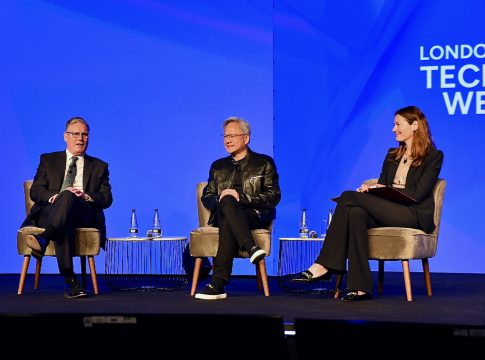AI Takes Center Stage in Europe: A New Era Begins
Artificial Intelligence (AI) is not just evolving—it’s now a vital piece of national policy in Europe, particularly in the UK. As London Tech Week kicked off, it became clear that the conversation around AI is shifting from a technology-centric dialogue to a broader discussion about societal impact and economic strategy.
A Transformational Partnership
At the event, Jensen Huang, the founder and CEO of NVIDIA, shared the stage with UK Prime Minister Sir Keir Starmer. Their collaboration signals a noteworthy pivot: once the realm of startups and tech enthusiasts, AI is now becoming a government priority. Huang emphasized that "every industry in the UK will soon be a tech industry" thanks to the proliferation of AI technologies.
Starmer echoed this sentiment, stating that his administration will explore AI applications across all government departments. His aim? To illustrate AI’s potential to transform citizens’ lives, from healthcare innovations to advancements in manufacturing.
Investments and Initiatives
To bolster this AI revolution, the UK government announced an ambitious investment plan amounting to approximately £1 billion earmarked for AI research and infrastructure by 2030. Notable initiatives include:
- A national AI skills program supported by NVIDIA to train developers in advanced AI techniques.
- The launch of an NVIDIA AI Technology Center focused on research in embodied AI, material sciences, and earth system modeling.
- Collaboration with the UK’s Financial Conduct Authority to create a secure sandbox for AI experiments.
Additionally, the Isambard AI supercomputer, the fastest in the UK, is set to be operational soon, enhancing the country’s computational capabilities.
Europe Leaps Forward
The UK isn’t working alone. Across Europe, nations are racing to develop AI frameworks. In Sweden, NVIDIA is partnering with prominent companies like AstraZeneca and Ericsson to create a national AI infrastructure. Germany is making strides with its Blue Lion supercomputer, a significant investment aimed at real-time simulations. Meanwhile, France is set to inaugurate Europe’s largest AI Campus, promising a sustainable approach to AI deployment.
Huang highlighted the unprecedented acceleration of AI advancements, stating, "AI has advanced a million times in the last decade." This echoes earlier technological leaps, drawing a parallel to the rapid development seen at the dawn of the internet.
What’s Next?
Upcoming events, such as NVIDIA GTC Paris at VivaTech, promise to reveal further developments in AI, showcasing how European innovators are crafting a robust framework for the future. With Huang set to headline these discussions, attendees can expect updates on NVIDIA’s Blackwell architecture and other groundbreaking initiatives.
The narrative is clear: Europe is not just participating in the AI revolution; it’s actively shaping its trajectory. This chapter may be only the beginning, but the momentum is palpable, and the implications for industries, economies, and societies are significant. As we look towards a future deeply integrated with AI, the conversation is shifting from "Why should we adopt AI?" to "How quickly can we implement it?"
Is this the dawn of a new technological renaissance in Europe? Only time will tell, but one thing is certain: AI is no longer just a trend—it’s a core element of our societal framework.

Writes about personal finance, side hustles, gadgets, and tech innovation.
Bio: Priya specializes in making complex financial and tech topics easy to digest, with experience in fintech and consumer reviews.

